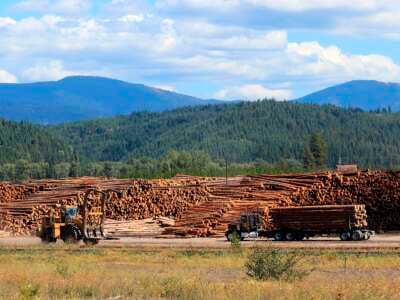Honest, paywall-free news is rare. Please support our boldly independent journalism with a donation of any size.
Standing at the edge of the Aldwell Forest clearcut just above the Elwha River in Washington State, the Murphy Company’s devastation of the landscape slaps you in the face. Here on land owned by the state’s Department of Natural Resources (DNR), a beautiful mature forest has been logged for hardwood, plywood, and other wood products. Hacked-off stumps are visible in all directions, a few trees left to stand. The former forest floor, once rich with organisms and nutrients that fed life, now stands heaped into huge slash piles to be burned. The land doused with herbicide to kill any competitors to Douglas fir seedlings that will become a new tree plantation monoculture.
The contrast with the remaining intact Elwha legacy forests, located nearby in the watershed, couldn’t be starker. There, in naturally regenerated forests more than a century old, large Douglas fir, western red cedar and big-leaf maple trees festooned with moss and licorice ferns surround you. Native sword ferns, trillium, salal, red huckleberry, lichen, and other native vegetation in multiple shades of brilliant green abound.
After DNR put more Elwha legacy forest on the chopping block during a November 2024 auction, environmentalists, citizens, and forest defenders are fighting to stop Murphy’s logging there through lawsuits and direct action.
Stay in the loop
Never miss the news and analysis you care about.
For over a month, a tree-sit launched by a grouping called the Olympic Forest Defenders (OFD) blocked the road into the Parched forest site scheduled for destruction. The sit received broad support through encampments, rallies, and continuous supply efforts from community members. After a judge refused to extend an injunction against logging, police and violent vigilantes attacked the sit and encampment. The OFD made a decision to end the tree-sit on June 15 for the safety of those involved.
“Our commitment to defend the forests and waters of the Olympic Peninsula remains strong,” states an OFD press release. “To the vigilantes, the DNR cops, and state-sponsored repression, we say: You did not dig up our roots. We are still here. Stop pillaging our people. Stop pillaging our forests. Stop pillaging our waters. Our movement has not been uprooted. It is just beginning to grow.”
The Restored Elwha and the Lower Elwha Klallam Tribe

The Elwha River runs out of the protected Olympic National Park. It is the pulsing heart of the ancestral homelands of the Lower Elwha Klallam tribe. Two large hydropower dams, the Elwha and Glines Canyon, were built on the river between 1910 and 1927 to fuel timber processing and industry in the Port Angeles area. The dam builder didn’t bother to include legally required mechanisms for fish passage.
The dams blocked the free-flowing river, flooding tribal village and cultural sites and decimating the tribe’s way of life. Ninety-three percent of the upstream salmon spawning habitat was cut off, leading to near extirpation of pristine populations of wild salmon in the river that was central to the Lower Elwha people’s life and culture. Before the dams, the Elwha was famous for its enormous chinook salmon, precious to the tribe and a primary food source for orca whales of the Salish Sea.
Tribal elders passed down to their children and grandchildren the stories of the river filled with fish before the dams. Under tribal pressure that spanned generations, a $325 million project was launched in 2011 by tribal, governmental, and academic agencies and scientists to restore the river ecosystem by removing the dams; restoring the river’s flow; planting native plants; and building back the populations of five species of Pacific salmon, steelhead, and other species. The dams were finally taken down in the years between 2011 and 2014 — more than 20 years after a 1992 Congressional Act ordered it.
The project has been an inspiring success in restoring the anadromous fish populations and the ecosystem, as well as a source of pride for the Lower Elwha people. The river returned to natural channels after dam removal, and after a few years of major sediment release, it began to clear. The released sediment rebuilt the delta and estuary at the Elwha mouth on the Strait of Juan de Fuca, which is critical to rearing juvenile migrating fish.
But new logging of forests on the hills just above the river represents an assault on the restoration efforts that have been achieved. It also explains the deep feelings held among tribal members, Forest Defenders, conservationists, and others who care about the land and river ecosystem.

A petition circulated in October 2024 by Lower Elwha tribe members and signed by over half of the members of the tribe, as well as 2,500 other people, states that,
We do not understand a way of thinking that would spend hundreds of millions on Elwha River restoration but continue to industrially log in that same watershed. We do not understand a way of thinking that takes too much and says it is never enough; that would disrespect a River that gives us so much life and now hope.
Our ancestral knowledge and sacred obligation to the natural world teaches us a different path. We have inherent and treaty protected rights in these lands as our usual and accustomed gathering areas. Together, we call for the protection of the Elwha Watershed as a commitment to our mutual future and to the wellbeing of all who depend upon it. We ask you to stop these planned timber sales and heed our call to be guided by principles of respect and reciprocity in caring for the watershed.
Lawsuits in Defense of the Elwha Legacy Forests
The DNR’s November 2024 auction of the now-threatened Elwha forests to the Murphy Company were among others the DNR Board of Resources rushed through in apparent anticipation of new Public Lands Commissioner Dave Upthegrove taking office in January 2025. Upthegrove had pledged to protect legacy forests if elected.
The Tree Well and Parched logging plans threaten to cut over 300 acres of mature legacy conifer forest, some of which has never been logged. Two lawsuits were filed to overturn the sales in December 2024 by the Earth Law Center (ELC) in conjunction with the Orca Network, the Center for Whale Research, and the Legacy Forest Defense Coalition (LFDC).
The lawsuits lay out a coherent, detailed picture of the damage new logging would cause to the river ecosystem. The ELC suit alleges that the DNR is violating the state Public Lands and Environmental Policy Acts by failing to perform an adequate environmental assessment of the logging’s impact on mature, structurally complex, and biodiverse forests. The two forest sites are critical to carbon sequestration and as habitat for wildlife and culturally significant native plants.
The lawsuit also argues scientific studies have shown logging negatively impacts stream flows, hydrology, and water temperature — all factors critical to supporting the Elwha system and its salmon populations, which in turn support populations of the critically endangered southern resident orcas.
The groups’ also charge that logging on steep slopes in these sites above the Elwha and its tributaries threatens slope stability, pointing out the potential impact to Port Angeles’s water supply.
LFCD is suing for injunctive relief against the sale of the forests on the basis that the DNR is neglecting to follow its own policies to regenerate old-growth forest on 10-15 percent of state forestlands — a legal approach that has successfully paused other DNR timber sales.
The LFDC’s Kyle Krakow told Truthout in an emailed statement that the group has “appealed a total of 32 sales in lawsuits that are still ongoing in most cases. Collectively, these timber sales threaten over 2,300 acres of biodiverse and carbon-dense legacy forests across western Washington.”
Truthout also spoke to LaTrisha Suggs, a restoration planner for, and enrolled member of, the Jamestown S’Klallam tribe. Her family has lived for time immemorial in Clallam County. Suggs is also a Port Angeles City Council member who worked as a restoration planner for the Lower Elwha tribe on the river restoration project.
In a declaration filed in support of the LFDC lawsuit, Suggs stated that,
The sites of many of the proposed and sold parcels have steep slopes, and the levels of logging that occurs has an impact on the potential for landslides, particularly with the impacts of climate change and increased rain events in Port Angeles. When landslides occur, because the trees can no longer hold back the soil due to clear cutting, the soil runs into the streams and rivers, blocking access to salmon and impacting water quality. The soils of mature forests act as storage for water that the plant communities rely on during the summer months.
Her declaration also stated that Port Angeles has been under a stage three water shortage each summer since 2022, and Clallam County has been under a drought advisory for years — issues expected to get worse as climate change advances.
Elizabeth Dunne is ELC’s director of legal advocacy. She lives near the Elwha River and co-founded the Elwha Legacy Forest Coalition (ELF) after DNR sanctioned logging on the Aldwell forest. Dunne and the coalition’s successful efforts to stop a prior timber sale in the Elwha has been told in an award-winning short film, Last Stand, Saving the Elwha River’s Legacy Forests.
She shared a map with Truthout showing that greater than 50 percent of the Elwha’s legacy forests have been logged in just the last 17 years; little older forest remains in the Elwha watershed. Now DNR has plans for logging 800 more acres.
“The Elwha River is really speaking for many of these ecosystems that are suffering at the hands of over-extraction and exploitation for profit without having any kind of sense of responsibility of the balance that we need to show back to the Earth if we are going to continue to survive as a species. And not just survive but be able to thrive,” Dunne said. “Imagine a world where we can go fishing, where we have abundant ecosystems, and they’re not all controlled and commodified, and we’re able to, sustain ourselves.”
The Fight to Save the Parched Legacy Forest
In early May, Murphy began building roads into the Parched timber units, tearing down trees and bringing in gravel. In response, on May 7 the Olympic Forest Defenders began their tree-sit, blocking the road into the Parched site off U.S. Highway 101.
The Forest Defenders demanded an immediate cancellation of the Parched timber sale, a pause on all logging in the Elwha watershed, and a permanent ban on logging the remaining mature forests in western Washington.
The tree-sit involved a cable pulley stretched from logs and other debris blocking the middle of the logging road connected to a “dunk tank”-type platform 60-80 feet up a nearby large grand fir tree. Cutting the cable would cause the sitter on the platform to come crashing down.
Truthout was able to visit and speak there and on the phone with “Fable,” a 25-year-old tree-sitter, about the goals of the tree-sit and why they were participating. “There’s a long history in the Pacific Northwest of direct action and tree-sitting being effective, especially when done in conjunction with some sort of legal pressure,” Fable told Truthout.
They told Truthout they had grown up a timber farm and helped manage it with their parents. The family would talk about the impact of logging on the land and the creeks, and Fable would go salmon fishing with their dad and uncles, learning about the connection between forests, rivers, and salmon.
Fable told Truthout that they had studied math to get a master’s degree, but their recent experience of caretaking for a loved one who was sick changed their life. The experience “made me want to be more involved in things that actually make change in the world,” they said. “Realistically, the most good you can do is caring for people and caring for land, and keeping people and land safe from the really evil things that are out there.”
Rallies were held at the Parched site, and for over a month community members from around the region continuously brought in supplies and camped to protect the sitter. DNR officers initially surrounded the tree, running generator-powered lights around the clock before backing off. They would at times try to stop people from going in or threaten them with arrest.
“The support’s been great and kind of surprising,” Fable said. “People understand how critical of a moment this is and that this kind of action is necessary, which really gives me a lot of hope because that’s how I feel. And to not just be a lone person doing something like this is just really, really cool.”
After the tree-sit began, Land Commissioner Upthegrove, who placed a six-month pause on logging legacy forests, condemned the sitters saying, “This stunt is dangerous, reckless and counterproductive…. Their actions put the safety and lives of my employees at risk, and I will seek the prosecution of those involved to the fullest extent of the law. This kind of dangerous vandalism makes it harder to advance a positive environmental agenda.”
The sitters’ message, on the other hand, was: “Dave Upthegrove promised to protect mature forests. We are here helping him keep his promise.”
Upthegrove’s threats ignited phone calls and emails to his office, including from some who had worked for him because of his campaign pledges. Nonetheless on May 28, he doubled down on threats to the Forest Defenders, saying, “We intend to hold those responsible accountable.”
A statement on DNR’s website says Upthegrove is reassessing the process on legacy forests, but that, “Some paused sales could be reconfigured and brought forward to auction once the criteria to exclude structurally complex forests that are critical to carbon storage and habitat biodiversity are developed.” Upthegrove also said he’s committed to protect sales approved before he took office, saying, “It’s important to defend policies and the authority of the agency.”
It’s unclear what DNR will do after the six-month “pause” in legacy forest sales ends. In a letter to Clallam County Democrats, Upthegrove said he intended to bring forward a policy to protect 77,000 acres of older forests, a significant step if done, though less than the 106,000 acres of legacy forest currently unprotected. He claimed, without evidence, that the tree-sit had endangered DNR employees.
After first ordering a two-week injunction against logging and compelling DNR to produce administrative records supporting its decision to approve the timber sales, a Clallam County Superior Court judge refused to extend the injunction past May 23. On June 6, she ruled against an LFDC filing which sought to prevent logging until both lawsuits could receive a full hearing on their merits. Hearings on the merits should be held in coming months.
Dunne told Truthout that she was disappointed in the judge’s ruling. “Existing policies aside, what we need today is action commensurate with the gravity of the extinction and biodiversity crisis: a clear directive creating an Ecological Forest Reserve and permanently protecting all remaining legacy forests on state lands for their intrinsic value and as essential to the survival of all species,” she said.
On June 13, police of unknown affiliation swept the camp, seizing supplies and hindering the ability of the encampment to protect the tree-sitter’s life. (A DNR spokesperson told Truthout he couldn’t comment on the raid of the encampment or the vigilante attacks, only saying DNR had “cleared the many makeshift barricades” on the logging road.) Despite this, the community rallied in support, bringing new supplies and people to keep the sit protected.
Over the next days, violent vigilantes attacked the tree-sit twice. They tampered with the cable and tripod anchoring the platform supporting the tree-sitter, causing it to dangerously dip. Vigilantes also drunkenly threatened to kill the Forest Defenders and threw bottles around. One pointed a gun at Forest Defenders, walking aggressively toward them and then shot into the forest. After this, the Defenders decided to safely evacuate the site before someone was hurt or killed.
At press time, the tree-sit and encampment are gone but the outcome with the threatened forests remains undetermined. Those protecting the forests remain committed to their aims and lawsuits on the merits of the logging remain to be heard.
“Dave Upthegrove ran as a progressive, and that’s kind of the first and main legislator we’re pushing back against right now. I don’t know that we would have done things any different if there weren’t these sort of executive orders (like Trump’s on timber sales) going into place, and this sort of over-escalation and fascism in our country … and is giving people hope that even under a really threatening administration, we can keep pushing back against it,” Fable told Truthout.
Keep the press free. Fight political repression.
Truthout urgently appeals for your support. Under pressure from an array of McCarthyist anti-speech tactics, independent journalists at Truthout face new and mounting political repression.
We rely on your support to publish journalism from the frontlines of political movements. In fact, we’re almost entirely funded by readers like you. Please contribute a tax-deductible gift at this critical moment!
Read full article at source
Stay informed about this story by subscribing to our regular Newsletter


